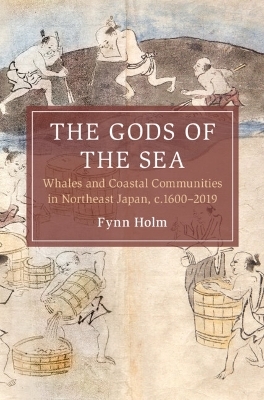
The Gods of the Sea
Whales and Coastal Communities in Northeast Japan, c.1600-2019
Seiten
2023
Cambridge University Press (Verlag)
978-1-009-30551-8 (ISBN)
Cambridge University Press (Verlag)
978-1-009-30551-8 (ISBN)
Challenging common portrayals of Japan as a centuries-old whaling nation, Fynn Holm shows that many coastal communities in early modern Northeast Japan believed whales to be the incarnation of the god of the sea that brought fish to the shore, leading to violent anti-whaling protests that shocked the country.
Japan is often imagined as a nation with a long history of whaling. In this innovative new study, Fynn Holm argues that for centuries some regions in early modern Japan did not engage in whaling. In fact, they were actively opposed to it, even resorting to violence when whales were killed. Resistance against whaling was widespread especially in the Northeast among the Japanese fishermen who worshiped whales as the incarnation of Ebisu, the god of the sea. Holm argues that human interactions with whales were much more diverse than the basic hunter-prey relationship, as cetaceans played a pivotal role in proto-industrial fisheries. The advent of industrial whaling in the early twentieth century, however, destroyed this centuries-long equilibrium between humans and whales. In its place, communities in Northeast Japan invented a new whaling tradition, which has almost completely eclipsed older forms of human-whale interactions. This title is also available as Open Access.
Japan is often imagined as a nation with a long history of whaling. In this innovative new study, Fynn Holm argues that for centuries some regions in early modern Japan did not engage in whaling. In fact, they were actively opposed to it, even resorting to violence when whales were killed. Resistance against whaling was widespread especially in the Northeast among the Japanese fishermen who worshiped whales as the incarnation of Ebisu, the god of the sea. Holm argues that human interactions with whales were much more diverse than the basic hunter-prey relationship, as cetaceans played a pivotal role in proto-industrial fisheries. The advent of industrial whaling in the early twentieth century, however, destroyed this centuries-long equilibrium between humans and whales. In its place, communities in Northeast Japan invented a new whaling tradition, which has almost completely eclipsed older forms of human-whale interactions. This title is also available as Open Access.
Fynn Holm is a Postdoctoral Researcher in the Economic, Social, and Environmental History department at University of Bern.
Part One. Living with Whales, 1600-1850; 1. The Whale Pilgrimage; 2. The Beached God; 3. Bringing Sardines to the Shore; 4. Establishing Whaling in the North; Part Two. Destroying the Cetosphere, 1850-2019; 5. The Whaling Empire; 6. The First Whaling Town; 7. Burning Down the Whaling Station; 8. Washing Away the Past.
| Erscheinungsdatum | 15.08.2023 |
|---|---|
| Reihe/Serie | Cambridge Oceanic Histories |
| Zusatzinfo | Worked examples or Exercises |
| Verlagsort | Cambridge |
| Sprache | englisch |
| Maße | 160 x 235 mm |
| Gewicht | 470 g |
| Themenwelt | Geisteswissenschaften ► Geschichte ► Regional- / Ländergeschichte |
| Geisteswissenschaften ► Geschichte ► Teilgebiete der Geschichte | |
| Weitere Fachgebiete ► Land- / Forstwirtschaft / Fischerei | |
| ISBN-10 | 1-009-30551-4 / 1009305514 |
| ISBN-13 | 978-1-009-30551-8 / 9781009305518 |
| Zustand | Neuware |
| Haben Sie eine Frage zum Produkt? |
Mehr entdecken
aus dem Bereich
aus dem Bereich
Erinnerungen
Buch | Softcover (2024)
Pantheon (Verlag)
16,00 €


